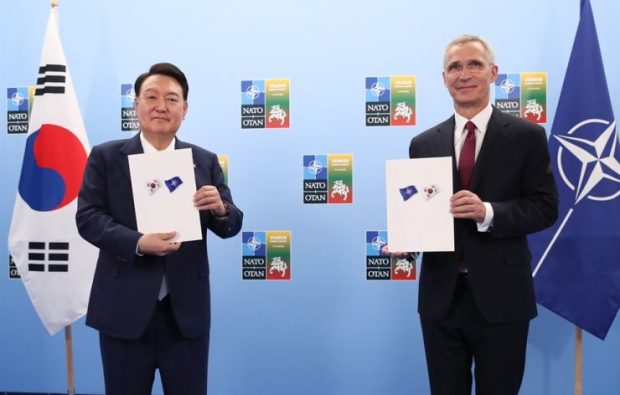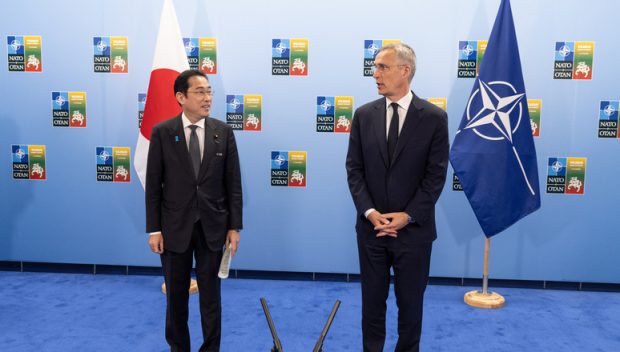NATO’s partnerships in Asia: Practical cooperation in response to changes in global security environment?
 NATO Secretary General Jens Stoltenberg with South Korean President Yoon Suk Yeol
NATO Secretary General Jens Stoltenberg with South Korean President Yoon Suk Yeol
By Habib Toumi
SEOUL: Individually Tailored Partnership Programs, cooperation on transnational issues that span regional borders, enhanced military information sharing, a potential new liaison office … the North Atlantic Treaty Organization (NATO) is rapidly deepening engagement with its Asia partners – South Korea and Japan – while keeping the door open for new regional partners.
At this year’s summit in Vilnius, Lithuania, South Korean President Yoon Suk Yeol held bilateral meetings with 13 leaders and in each agreed to work together to restore peace in Ukraine.
Yoon also sought to deepen security cooperation with NATO by announcing Seoul’s decision to increase military information sharing with the alliance through the Battlefield Information Collection and Exploitation System that helps members share military secrets and determine the next steps based on the information.
In addition, South Korea and NATO adopted the Individually Tailored Partnership Program to institutionalize bilateral cooperation in 11 areas, ranging from antiterrorism and nonproliferation to emerging technologies and cyberdefense.
At the summit, NATO Secretary General Jens Stoltenberg welcomed Japanese Prime Minister Fumio Kishida to the Summit and said that no partner is closer than Japan.
Stressing that “security is not regional but global,” Stoltenberg hailed the new partnership program between NATO and Japan that will further enhance cooperation across several areas.

NATO Secretary General Jens Stoltenberg and Prime Minister Fumio Kishida of Japan
The ITPP between NATO and Japan outlines three strategic objectives for 2023-26: Strengthening dialogue and consultations, enhancing resilience and boosting interoperability.
Kishida said Japan’s new deal with NATO comes in response to an increasingly severe international security environment as well as in recognition that the security of Europe and the Indo-Pacific are “inseparable.”
The partnerships between NATO and South Korea and Japan largely focus on areas of global concern, including maritime security, cybersecurity, climate change, emerging and disruptive technologies, arms control, space, supply chains, resilience and the interoperability of their militaries. Strengthening the partnerships is “a vital part of responding to the new challenges and threats”.
NATO’s deeper partnership with two Asian countries is a crucially important development that goes beyond traditional and confined cooperation to provide a step-by-step and far-reaching pathway to explore realistically how and where Euro-Atlantic and Asian security interests intersect.
In 2018, NATO was under uncertainty after U.S. President Donald Trump’s inflammatory remarks over months added to jitters among U.S. allies about the future of the alliance.
In 2019, French President delivered a searing criticism that “what we are currently experiencing is the brain death of NATO.”
Now in 2023, NATO, driven by a “NATO 2030” strategic concept showing the alliance is not brain dead, has stepped into the real world with greater aptitudes and better opportunities to adapt to significant shifts in politics and crucial challenges to security.
Having replaced the largely outdated 2010 concept and eliminated the shackling two-speed approach where the political “wisdom” was much slower than the military readiness, NATO’s Asia outreach seems to provide greater determination and better flexibility in tackling an increasingly sharpened competitive environment and its ominous challenges.

























































